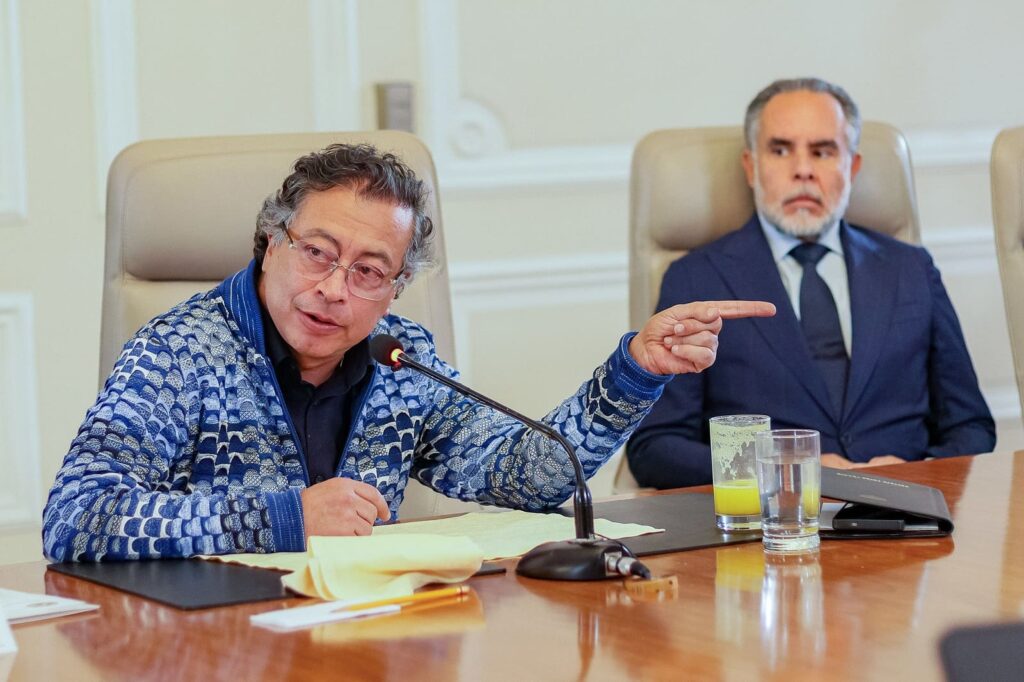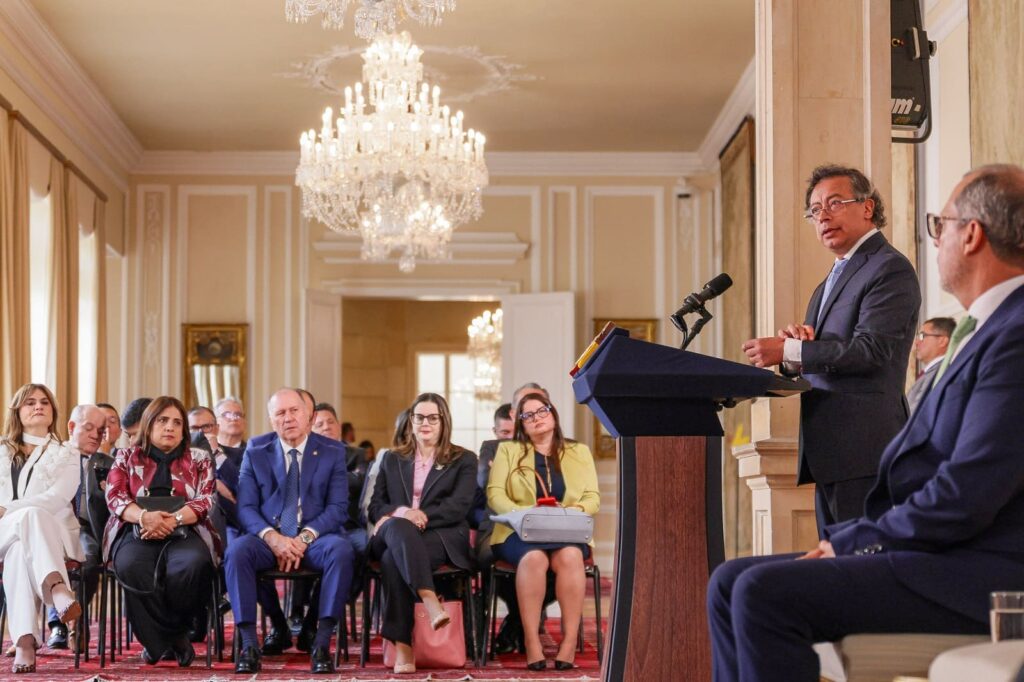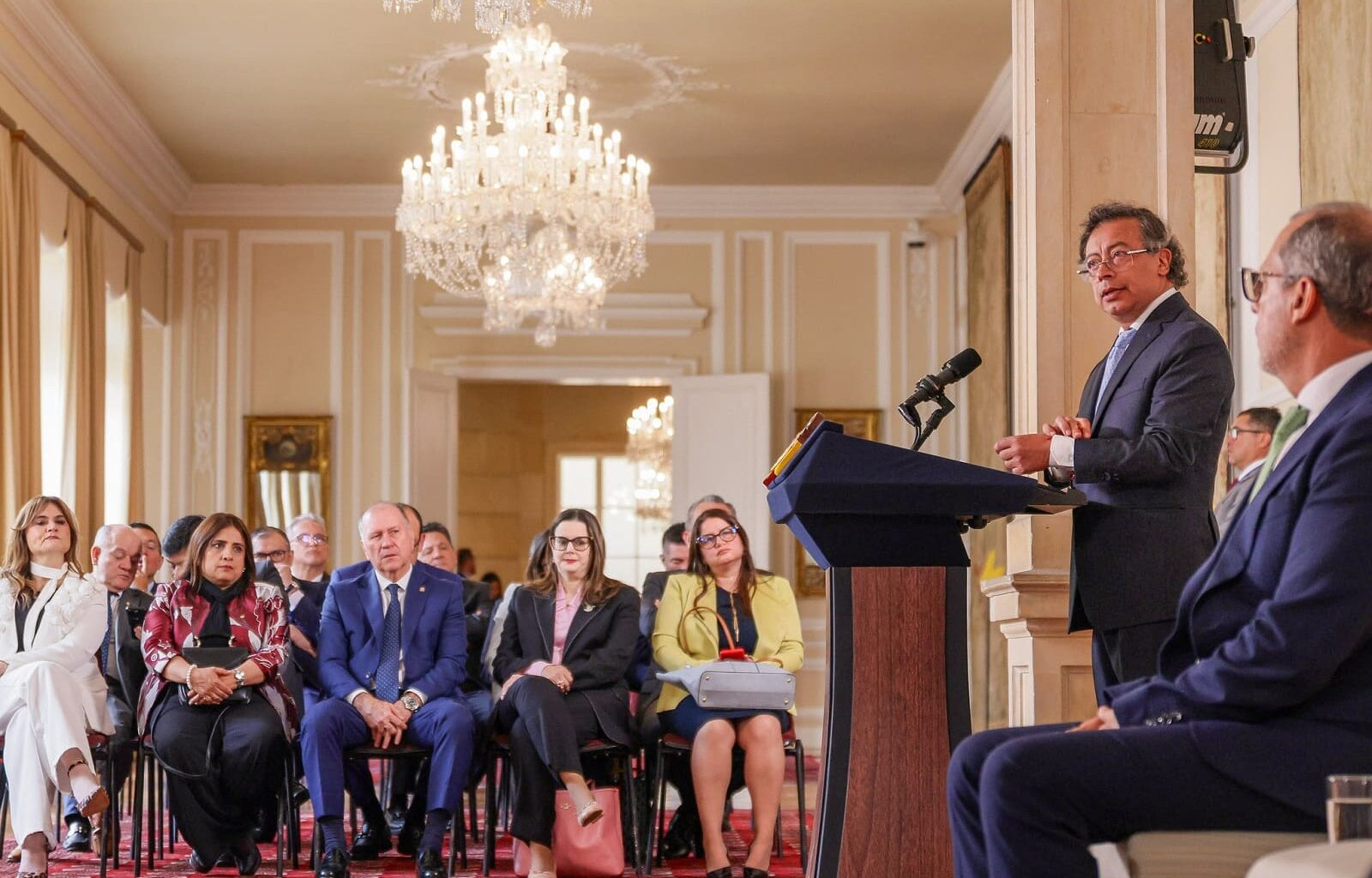
Colombia’s Petro declared that “Colombia not the enemy of the US” and exonerates Marco Rubio of alleged plots in an attempt to ease tensions. Credit: Joel Gonzalez / Presidency of Colombia.
President Gustavo Petro declared that Colombia “is not the enemy” of the U.S., amid the latest episode of the worsening diplomatic crisis between the two nations.
In an attempt to ease tensions, Petro aslo stated that he does not “believe that Marco Rubio is involved in a coup d’état,” referring to the alleged complicity of U.S. officials in a plot supposedly orchestrated by former Colombian Foreign Minister Alvaro Leyva.
He also clarified that he had summoned the Colombian ambassador in Washington for consultations to review the status of the seven-point bilateral agenda he proposed between the United States and Colombia.
These agenda items include: decarbonization of the economy, energy transition, revitalization of the Amazon rainforest, the fight against drug trafficking, an immigration treaty, reform of the global financial system, and political solutions to regional conflicts in South America and the Caribbean.
‘The enemy is not Colombia,’ says President Petro
In a public message, President Gustavo Petro addressed “U.S. officials of Cuban origin”—a reference to figures in the Trump administration, including Secretary of State Marco Rubio—stating that “the enemy is not Colombia.”
“Choose your enemy. We are not it. If, in their society, these [drug trafficking] organizations are killing 100,000 citizens per year, the enemy is not Colombia. Colombia can help them solve the problem,” he said. He also emphasized, “I do not kneel, I do not let myself be pressured, and I am not intimidated by a [U.S.] congressman calling me a narco-terrorist.”
Petro argued that “those leading Trump toward a rupture with Latin America are doing so to weaken the unified front we’ve built against multinational criminal organizations.”
He concluded with a warning: “If the U.S. does not want to cooperate, we will continue with the Europeans. We will not be left alone. But we must understand who the real enemy is—and today, it is not ideological but criminal, just as the violence in Colombia today is no longer ideological, but criminal.”
#NoticiaW | “Yo no me arrodillo ni me dejo presionar (…) esos que están llevando a Trump hacia rupturas en América Latina, lo están llevando es para que se debilite el frente que tenemos contra las organizaciones del crimen”, dijo el presidente Petro (@petrogustavo) pic.twitter.com/KaF6StRIKf
— W Radio Colombia (@WRadioColombia) July 3, 2025
Petro clarifies that he does not believe ‘that Marco Rubio is in a coup d’état’
In an attempt to ease tensions with the U.S., Colombian President Gustavo Petro was categorical: “I do not believe that Marco Rubio is involved in a coup d’état,” he said Thursday, referring to an alleged plot uncovered in recent days, supposedly led by former minister Alvaro Leyva.
“I don’t believe Marco Rubio is part of a coup (…) because the far-right figures involved in that didn’t go to Rubio’s office—they went to others. And I’m not going to be made a fool over that. That’s a matter for the Attorney General to determine, not me,” the president clarified.
Petro instead pointed to internal Colombian actors—whom he associated with the far right and what he calls “the drug trafficking junta”—as sponsors of alleged efforts to destabilize his government.
On this matter, the president warned that “if relations between Colombia and the United States are severed, much of the framework we have built—not only in this administration—to fight organized crime will collapse.”
In this way, Petro placed blame on domestic elements, claiming they have turned the U.S.-Colombia relationship into an obstacle in the fight against multinational criminal organizations.

In an official act, President Petro clarified that he has no suspicions about US Secretary of State Marco Rubio and the alleged plot to overthrow him. Credit: Joel Gonzalez / Presidency of Colombia.
Colombia and the bilateral agenda with the U.S. to resolve the diplomatic crisis
Following a new escalation in the diplomatic crisis between Colombia and the United States—marked yesterday by both countries calling their ambassadors for consultations—Colombian President Gustavo Petro made a proposal to the U.S., emphasizing in a post on X that “all my letters and communications to President Trump I have written personally, and this statement as well—I write from my own thoughts and my own hand.”
He added: “In response to the consultation call for Mr. McNamara, acting head of the U.S. Embassy in Colombia, I am calling our ambassador Daniel Garcia-Peña in the U.S. back for consultations. Daniel must return to brief us on the progress of the bilateral agenda to which I committed at the beginning of my administration.”
It is worth noting that relations between Colombia and the United States are currently experiencing an unprecedented level of estrangement and tension, especially since the arrival of Donald Trump to the U.S. presidency.
Amid disputes over immigration and, above all, the fight against drug trafficking—which threatens Colombia’s continued participation in the U.S. certification system, a decision expected in two months—ideological differences between the two governments now risk undermining the historically strong diplomatic ties between the countries.
The seven points on the Colombian bilateral agenda
In this regard, Petro recalled that Colombia maintains a proposed bilateral agenda consisting of seven points that he recalled in his message on social networks. These points are:
Energy Transition and Economic Decarbonization: The President proposes an electrical interconnection between South America, Panama, and North America, leveraging the region’s potential for clean energy.
Environmental Protection: The restoration of the Amazon rainforest and the Chocó biogeographic region is proposed, aiming for these ecosystems to act as major carbon sinks.
Combating Transnational Drug Trafficking: President Petro warns of a new threat: a global criminal network operating under the name ‘junta del narcotráfico’ (drug trafficking board), based in Dubai, which brings together mafias of various nationalities. He proposes a coordinated attack against these structures and their finances.
Migration Agreement Based on Human Dignity: A treaty is suggested that respects U.S. sovereignty on migration matters but guarantees dignified treatment for migrants.
International Financial Reform: Colombia proposes that the U.S. support a mechanism allowing debt to be swapped for climate action, with a target of up to 25 trillion dollars, in support of the fight against climate change.
Peaceful Resolution of Regional Conflicts: The head of state advocates for joint work to find negotiated solutions to the crises in Venezuela, Cuba, and Haiti, and for strengthening the Greater Caribbean as a space for cooperation.
Call for a U.S.–CELAC Summit: Finally, the President proposes the need to hold a summit between the United States and the countries of Latin America and the Caribbean to consolidate this new common agenda.
All my letters and communications to President Trump I have written personally, and this statement likewise comes directly from my own thoughts and my own hand:
In response to the decision by Mr. McNamara, chargé d’affaires of the U.S. Embassy in Colombia, to return for…
— Gustavo Petro (@petrogustavo) July 3, 2025
